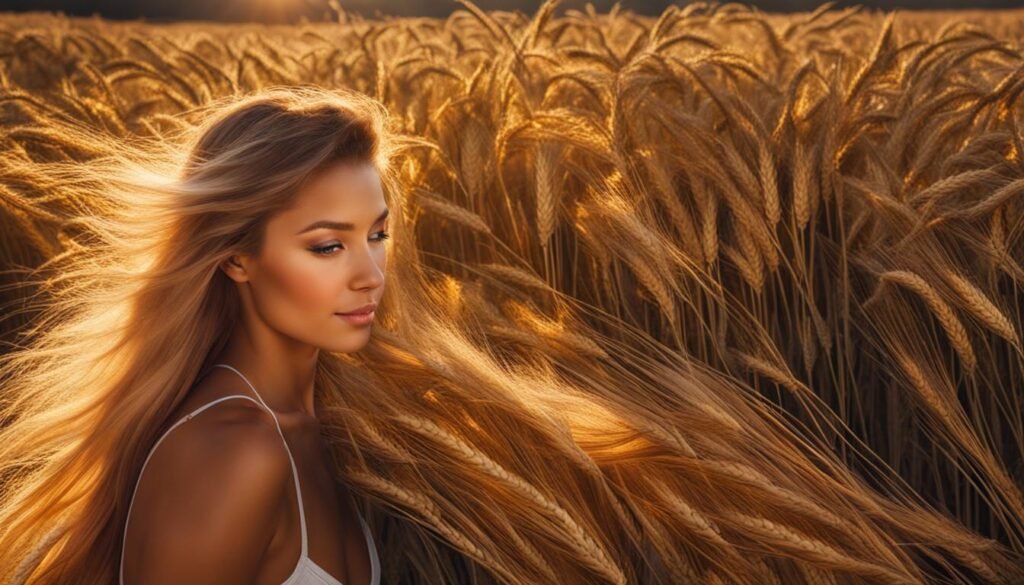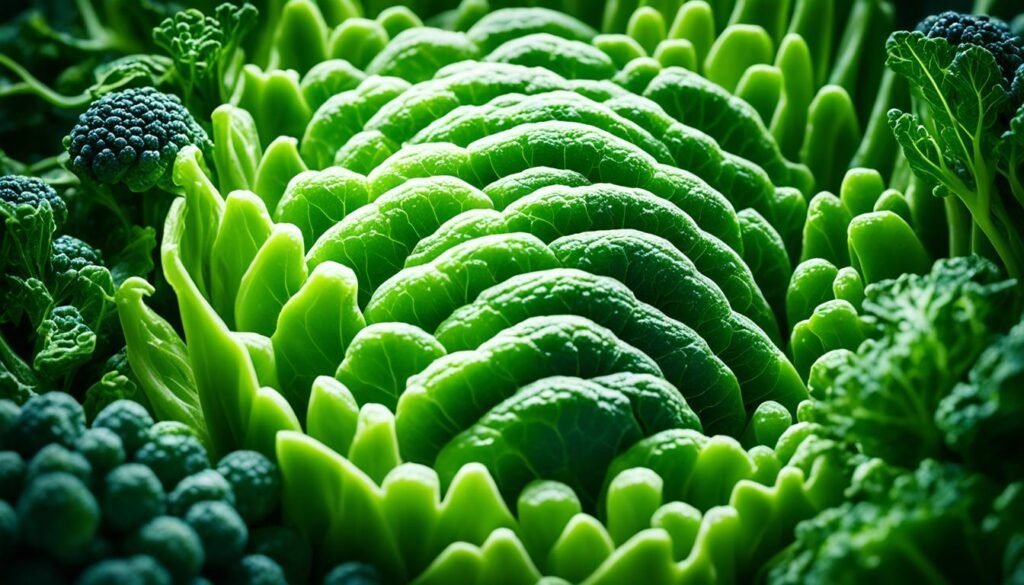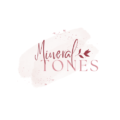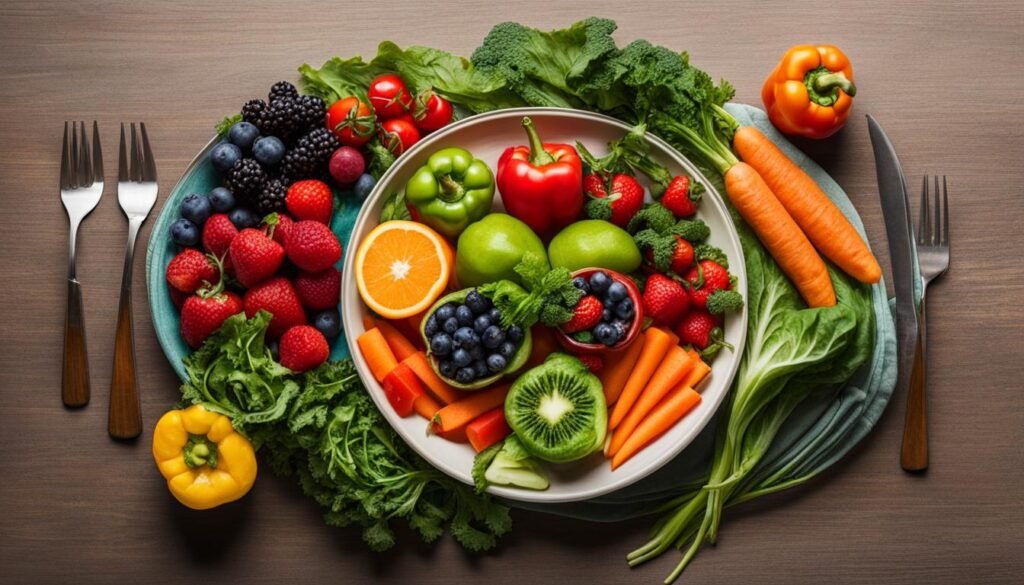Do you wish you had stronger, healthier hair? Are you tired of dealing with hair loss or lackluster locks? The solution may be closer than you think. While we often turn to expensive hair products and treatments, the key to achieving vibrant and lustrous hair lies in our diet. Yes, you read that right! What you eat can directly impact the health of your hair. So, what are the best foods to include in your diet for healthier hair? Let’s explore the diet tips and nutritional secrets that can transform your hair from dull to fabulous.
Key Takeaways:
- Incorporate nutrient-rich foods into your diet to promote healthy hair growth and prevent hair loss.
- Deficiencies in vitamins and minerals can lead to hair loss, so ensure you are getting enough of these essential nutrients.
- Protein, B vitamins, omega-3 fatty acids, antioxidants, and minerals play critical roles in hair health and growth.
- Vitamin D, vitamin A, vitamin E, and collagen also contribute to the overall health and vitality of your hair.
- Stress and inflammation can negatively impact hair health, so managing stress levels and consuming anti-inflammatory foods can be beneficial.
The Impact of Nutritional Deficiency on Hair Health
Nutritional deficiency can have a significant impact on hair health. Vitamins and minerals from food play a crucial role in the hair follicle growth cycle and cellular turnover. A diet lacking in essential nutrients can lead to hair loss, particularly deficiencies in vitamins B12 and D, biotin, riboflavin, and iron. These deficiencies can disrupt the hair growth cycle and contribute to hair loss. Consuming a balanced diet rich in these vital nutrients is essential for promoting healthy hair growth and preventing hair loss.
The Importance of Vitamins for Hair Health
Vitamins play a critical role in maintaining the overall health and vitality of our hair. Let’s take a closer look at some of the key vitamins necessary for healthy hair growth:
- Vitamin B12: This vitamin helps in the formation of red blood cells, which carry oxygen to the hair follicles. A deficiency in vitamin B12 can lead to poor hair growth and weakened hair strands.
- Vitamin D: This vitamin is essential for maintaining healthy hair follicles. Lack of exposure to sunlight can result in vitamin D deficiency, which may contribute to hair loss.
- Biotin: Biotin, also known as vitamin H, strengthens the hair strands and promotes hair growth. It plays a crucial role in the production of keratin, the protein that makes up the structure of the hair.
- Riboflavin (Vitamin B2): Riboflavin helps in the production of red blood cells, which deliver nutrients and oxygen to the hair follicles. Adequate levels of riboflavin are necessary for healthy hair growth.
These vitamins can be obtained through a balanced diet that includes foods such as eggs, fish, leafy greens, nuts, and seeds.
The Role of Minerals for Hair Health
In addition to vitamins, minerals are essential for maintaining healthy hair growth. Let’s explore some key minerals that contribute to hair health:
- Iron: Iron is necessary for the production of hemoglobin, a protein that carries oxygen to the hair follicles. Insufficient iron levels can lead to hair loss.
- Zinc: Zinc plays a crucial role in promoting hair follicle health and cell growth. It helps in the production of sebum, which keeps the scalp moisturized and the hair follicles nourished.
- Selenium: Selenium is an antioxidant that helps protect the hair follicles from damage caused by oxidative stress. It also aids in the regulation of hair growth.
Foods rich in these minerals include lean meats, seafood, nuts, seeds, and whole grains.
Lifestyle choices can also affect the absorption and utilization of these nutrients. Factors such as excessive alcohol consumption, smoking, and certain medications can interfere with the body’s ability to absorb and utilize vitamins and minerals, leading to nutritional deficiencies.
“A balanced diet rich in essential vitamins and minerals is key to maintaining healthy hair growth and preventing hair loss. Incorporating nutrient-dense foods into your daily meals can significantly improve the health and vitality of your hair.”
Remember, individual nutrient needs may vary, so it’s essential to consult with a healthcare professional or registered dietitian to determine the best dietary approach for your specific hair health concerns.
The Importance of Protein and B Vitamins for Hair Growth
When it comes to achieving healthy hair growth, protein and B vitamins play a vital role. Hair follicles are predominantly composed of protein, making it a crucial nutrient for supporting hair growth and maintaining hair health. Without adequate protein intake, the hair follicles may become weaker, resulting in hair loss and thinning.
B vitamins, including B6, B12, and folic acid, are also essential for promoting optimal hair growth. These vitamins are involved in various processes that contribute to hair health, such as the production of red blood cells that carry oxygen to the scalp and hair follicles. Additionally, B vitamins play a key role in the metabolism of amino acids, the building blocks of protein, which is necessary for hair growth.
Vegetarians and vegans may be at a higher risk of not getting enough B vitamins since they are predominantly found in animal-based foods. Therefore, it’s important for individuals following plant-based diets to ensure they are obtaining adequate amounts of B vitamins through fortified foods or supplements.
The Role of Protein in Hair Growth
Protein is crucial for hair growth as it provides the building blocks necessary for the production of new hair cells. Hair follicles require amino acids, the components of protein, to synthesize keratin, the protein that makes up the hair shaft. Ensuring an adequate intake of protein-rich foods, such as lean meats, poultry, fish, eggs, and legumes, can support healthy hair growth and prevent hair loss.
The Importance of B Vitamins for Hair Health
B vitamins are essential for maintaining hair health and facilitating the hair growth cycle. Vitamin B6 helps regulate hormone levels that can influence hair growth, while vitamin B12 supports the production of red blood cells necessary for oxygen transport to the scalp and hair follicles. Folic acid, another B vitamin, aids in the synthesis of DNA, the genetic material responsible for hair cell growth and division.
To ensure optimal hair growth and hair health, include a variety of foods rich in protein and B vitamins in your diet. The following table highlights some excellent food sources of protein and B vitamins:
| Protein Sources | B Vitamin Sources |
|---|---|
| Lean meats (chicken, turkey, beef) | Beef liver |
| Fish (salmon, tuna, sardines) | Eggs |
| Eggs | Milk and dairy products |
| Legumes (beans, lentils) | Fortified cereals |
| Nuts and seeds | Leafy green vegetables (spinach, kale) |
By incorporating these nutrient-rich foods into your diet, you can provide your body with the essential elements needed for healthy hair growth. Remember, maintaining a balanced diet that includes an adequate amount of protein and B vitamins is key to supporting optimal hair health and promoting vibrant, strong locks.
The Role of Omega-3 Fatty Acids in Hair Health
When it comes to maintaining healthy hair, omega-3 fatty acids are a vital component. These essential fats, which can be found in fatty fish like salmon and mackerel, flaxseed oil, and walnuts, offer numerous benefits for hair health and growth.
One of the key advantages of omega-3 fatty acids is their anti-inflammatory properties. Inflammation can damage hair follicles and impair their ability to produce healthy hair. Conditions such as androgenetic alopecia (pattern hair loss) and stress-induced hair loss have been linked to inflammation. By consuming foods rich in omega-3 fatty acids, you can help protect your hair follicles from inflammation-related damage.
In addition to their anti-inflammatory effects, omega-3 fatty acids also contribute to overall hair health. These fats are essential for providing nourishment to the hair follicles, promoting strong and resilient hair growth. Omega-3 fatty acids also help to keep the scalp hydrated, preventing dryness and flakiness that can hinder hair growth.
To further illustrate the benefits of omega-3 fatty acids for hair health, take a look at the table below:
| Omega-3 Rich Foods | Benefits for Hair Health |
|---|---|
| Fatty fish (salmon, mackerel, sardines) | Provides essential fatty acids for nourishing hair follicles |
| Flaxseed oil | Rich in omega-3s and promotes scalp hydration |
| Walnuts | Contains omega-3s and provides essential nutrients for hair growth |
Incorporating omega-3-rich foods into your diet can help improve hair health and reduce the risk of hair loss. Aim to consume these foods regularly to ensure an adequate intake of omega-3 fatty acids and support the growth of strong, healthy hair.
The Benefits of Antioxidants for Hair Growth
Antioxidants are essential for maintaining healthy hair growth. They play a crucial role in protecting hair follicles against oxidative stress, which can damage the hair follicle cells and disrupt the hair growth cycle.
Foods rich in antioxidants provide significant benefits for hair health. One powerful antioxidant is vitamin C, which can be found in berries. Vitamin C promotes collagen production and strengthens hair strands, helping to maintain healthy hair growth.
Consuming foods high in antioxidants can help protect the hair follicles from oxidative damage and maintain optimal hair growth. By incorporating antioxidant-rich foods into your diet, you can support hair health and prevent the negative effects of oxidative stress on your hair.
The Role of Minerals in Hair Growth
Minerals like iron, zinc, and selenium are essential for promoting healthy hair growth and maintaining overall hair health. These minerals play a vital role in various processes within the body that contribute to strong and vibrant hair.
Iron: Carrying oxygen to the hair follicles is crucial for promoting proper hair growth and repair. Iron deficiency can lead to hair loss as inadequate oxygen supply can weaken the hair follicles. Including iron-rich foods, such as spinach, lean red meat, and legumes, in your diet can help support optimal hair growth.
Zinc: Zinc is necessary for the hair growth and repair cycle to function properly. Zinc deficiency has been associated with hair loss, as it plays a crucial role in the synthesis of DNA, cell division, and protein production. Including zinc-rich foods, such as oysters, pumpkin seeds, and fortified cereals, can help ensure hair health and prevent hair loss.
Selenium: Selenium is an important mineral that helps protect the hair follicles against oxidative damage. It acts as an antioxidant, neutralizing harmful free radicals that can cause damage to the hair follicles. Including selenium-rich foods, such as Brazil nuts, fish, and whole grains, in your diet can help support healthy hair growth and protect against oxidative stress.
By incorporating these minerals into your diet, you can support optimal hair growth, prevent nutrient deficiencies that can contribute to hair loss, and maintain overall hair health.
| Mineral | Food Sources |
|---|---|
| Iron | Spinach, lean red meat, legumes |
| Zinc | Oysters, pumpkin seeds, fortified cereals |
| Selenium | Brazil nuts, fish, whole grains |
The Impact of Vitamin D on Hair Health
Vitamin D plays a crucial role in promoting hair health and supporting optimal hair growth. Research suggests that this essential nutrient is required for maintaining a normal hair cycle and may even initiate the growth phase of the hair follicles. Low levels of vitamin D have been associated with hair loss, making it important to ensure adequate intake of this vitamin for maintaining healthy hair.
One of the best natural sources of vitamin D is fatty fish, such as salmon. Consuming foods rich in vitamin D can help ensure that your body has enough of this nutrient to support hair growth and prevent hair loss. Incorporating salmon or other vitamin D-rich foods into your diet can provide numerous benefits for your hair and overall health.
Additionally, sunlight exposure is another way to increase your vitamin D levels naturally. Spending time outdoors in the sun can help your body produce vitamin D, which then supports the hair growth process. Remember to protect your skin from excessive sun exposure by using sunscreen and wearing protective clothing, while still allowing enough sunlight exposure to reap the benefits of vitamin D for your hair health.

| Food Source | Vitamin D Content (per 3 oz) |
|---|---|
| Salmon | 447 IU |
| Sardines | 208 IU |
| Tuna | 154 IU |
| Mackerel | 388 IU |
| Egg Yolks | 41 IU |
Incorporating vitamin D-rich foods into your diet or ensuring regular sunlight exposure can help maintain optimal levels of this nutrient, supporting healthy hair growth and preventing hair loss.
The Role of Vitamin A in Hair Health
Vitamin A plays a vital role in maintaining healthy hair and promoting proper sebum production on the scalp. Adequate levels of vitamin A are necessary for the production of sebum, an oily substance secreted by the sebaceous glands, which helps keep the scalp and hair hydrated and moisturized. Sebum acts as a natural conditioner for the hair, preventing dryness and brittleness. Moreover, vitamin A supports the growth and development of all cells in the body, including the cells that make up hair follicles, thereby promoting healthy hair growth.
However, it’s important to note that excessive intake of vitamin A can actually lead to hair loss. This is why it’s recommended to obtain vitamin A through a balanced diet rather than relying on supplements. Consuming foods rich in vitamin A, such as sweet potatoes, carrots, spinach, and kale, can help meet your body’s vitamin A requirements without the risk of overdosing.
| Foods High in Vitamin A | |
|---|---|
| Sweet potatoes | 1 medium-sized sweet potato provides over 400% of the recommended daily intake of vitamin A |
| Carrots | A half-cup of raw carrots contains about 100% of the recommended daily intake of vitamin A |
| Spinach | A half-cup of cooked spinach offers approximately 65% of the recommended daily intake of vitamin A |
| Kale | A one-cup serving of raw kale provides over 100% of the recommended daily intake of vitamin A |
Benefits of Vitamin A for Hair Health:
- Promotes proper sebum production, keeping the scalp and hair moisturized and healthy.
- Supports the growth and development of hair follicles, promoting healthy hair growth.
- Prevents dryness and brittleness, keeping the hair strong and lustrous.
By ensuring adequate intake of vitamin A through a well-balanced diet, you can maintain optimal hair health and contribute to the overall appearance and strength of your hair.
The Importance of Vitamin E for Hair Health
Vitamin E is an essential nutrient that plays a crucial role in maintaining hair health and promoting optimal hair growth. As an antioxidant, vitamin E helps protect the scalp and hair follicles from oxidative stress, which can damage hair follicle cells and disrupt the hair growth cycle.
While more research is needed to fully understand the direct benefits of consuming vitamin E-rich foods for hair growth, several studies have shown that individuals with hair loss tend to have lower levels of vitamin E in their bodies. This suggests that maintaining adequate levels of vitamin E may be important for preventing hair loss.
Fortunately, vitamin E can be easily incorporated into your diet through various food sources. Foods rich in vitamin E include:
- Avocados
- Almonds
- Sunflower seeds
- Spinach
- Swiss chard
Adding these vitamin E-rich foods to your meals can provide the necessary nutrients to support hair health and promote healthy hair growth.
Benefits of Vitamin E for Hair Health:
1. Antioxidant Protection: Vitamin E acts as a powerful antioxidant, protecting the hair follicles from damage caused by free radicals and oxidative stress.
2. Improved Circulation: Vitamin E helps improve blood circulation to the scalp, ensuring that hair follicles receive an adequate supply of nutrients and oxygen for healthy growth.
3. Nourished Scalp: Vitamin E moisturizes the scalp and helps maintain its health, preventing dryness, flakiness, and itchiness that can lead to hair problems.
4. Reduced Inflammation: Vitamin E has anti-inflammatory properties that can calm inflammation in the scalp, reducing the risk of conditions like dandruff and folliculitis.
5. Enhanced Hair Strength: By protecting the hair follicles and maintaining overall scalp health, vitamin E helps strengthen the hair strands, reducing breakage and promoting stronger, more resilient hair.
Incorporating vitamin E-rich foods into your diet can support optimal hair growth and contribute to overall hair health. Remember to consult with a healthcare professional or registered dietitian before making any significant changes to your diet or starting any new supplement regimen.
| Vitamin E-Rich Foods | Vitamin E Content (per 100g) |
|---|---|
| Avocado | 2.07 mg |
| Almonds | 26.2 mg |
| Sunflower Seeds | 35.17 mg |
| Spinach | 2.03 mg |
| Swiss Chard | 1.89 mg |
The Impact of Stress on Hair Health
Stress can have a significant impact on hair health and hair growth. Elevated levels of the stress hormone cortisol have been observed in individuals with hair loss disorders, such as androgenetic alopecia. Chronic stress can disrupt the hair growth cycle and lead to excessive hair shedding. Magnesium, found in foods like pumpkin seeds, plays a role in the body’s stress response and can help protect against the adverse effects of stress on hair health.
“Stress can really wreak havoc on hair health. Cortisol, the primary stress hormone, can interfere with the normal hair growth cycle, leading to hair loss. Managing stress levels and supporting the body with nutrients like magnesium can help maintain healthy hair.” – Dr. Rachel Johnson, Hair Specialist
The Role of Collagen in Hair Growth
Collagen plays a vital role in promoting healthy hair growth. As an essential protein, collagen provides the structural support for the hair fiber, which is predominantly made up of keratin protein. By increasing collagen intake through supplements or incorporating collagen-rich foods into your diet, you can potentially enhance hair growth by stimulating the growth phase of the hair follicles.
Protein and amino acids are necessary for the production of collagen in the body. Including foods rich in protein and amino acids, such as lentils, Greek yogurt, and beef liver, can help ensure proper collagen synthesis and support optimal hair growth.
If you prefer supplements, collagen supplements are available in various forms, including powders, capsules, and gummies. Consult with a healthcare professional to determine the most suitable collagen supplement for your needs. Emphasize maintaining a balanced diet to ensure holistic hair health and achieve the best results.

Summary:
Collagen is an essential protein for hair growth, providing the structural foundation for the hair fiber. Increasing collagen intake through supplements or collagen-rich foods can potentially enhance hair growth. Protein and amino acids are necessary for collagen synthesis, and incorporating foods rich in these nutrients can support proper collagen production. Remember to consult with a healthcare professional before starting any supplement regimen.
Ginger and its Effects on Hair Growth
Ginger, a widely used spice with a distinct flavor, offers more than just culinary delights. It contains natural compounds called gingerols and shogaols, which possess remarkable properties that can benefit hair health. These compounds exhibit both anti-inflammatory and antioxidant effects, serving as powerful allies in promoting hair growth and maintaining overall hair health.
Inflammation is a common factor in hair loss conditions, and the anti-inflammatory properties of ginger can help combat this issue. By reducing inflammation in the scalp, ginger may create a more favorable environment for hair follicles to thrive. Moreover, ginger’s antioxidant properties play a crucial role in protecting hair follicle cells from oxidative stress, which can damage them and disrupt the natural hair growth cycle.
Incorporating ginger into your diet or incorporating ginger supplements can be a meaningful addition to your hair care routine. By harnessing the potential benefits of ginger, you can support healthy hair growth and minimize the risk of hair loss. Whether you choose to add freshly grated ginger to your meals or enjoy a warming cup of ginger tea, this natural ingredient can positively impact your hair health.
Discover the incredible potential of ginger for hair growth and explore its anti-inflammatory and antioxidant benefits. By embracing the power of this versatile spice, you can nourish your hair from within and achieve optimal hair health.

